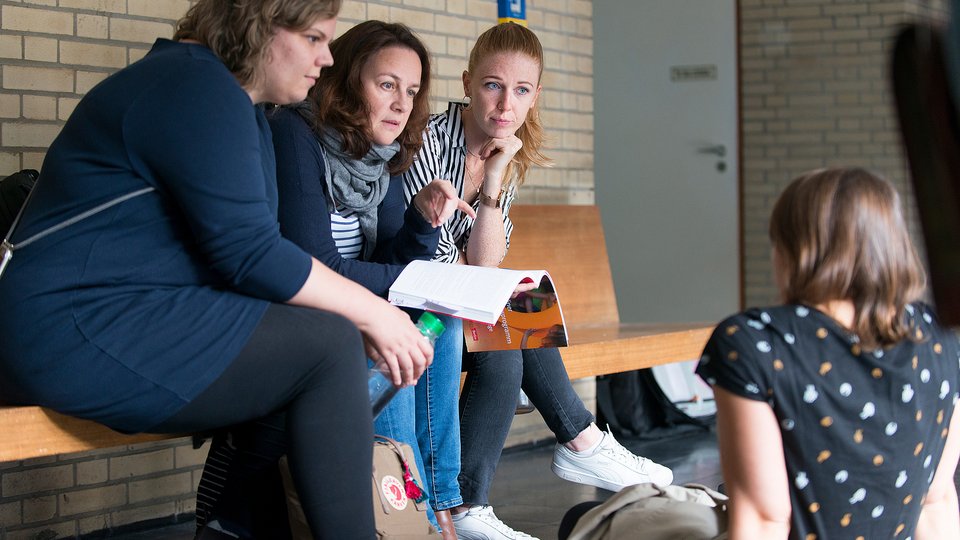Study program
The importance and the expansion of the capacities of public childcare facilities lead to a greater need for academically trained pedagogical specialists. The Bachelor of Arts degree program in Childhood Education qualifies students, among other things, for pedagogical work with children, for activities in the pedagogical area of primary schools, for management functions and specialist counselling in the elementary sector as well as for supporting families in their educational tasks. You can find more information on the professional profile in the downloads and links section.
With the aim of strengthening international perspectives as well as intercultural and transcultural competence, the internships provided for in the degree program can be completed abroad.
Advantages, perspectives, specialisations
Two main areas of study form the profile of the program:
- Language acquisition, language education and language support
Mono and multilingual language acquisition, German as a first and second language, literacy, acquisition of written language and language support
- Religion as a dimension of education
Dealing with children's questions regarding meaning and existence, reflection on one's own approach to religion, orientation in life’s multi-religious world
General information on the study program
The training and professional experience of state-recognised educators can be credited to the degree program after an examination procedure. As a rule, this recognition leads to a reduction in the time required for the individual semesters.
Introduction
The study program is based on a holistic understanding of child development. Interdisciplinary events promote the exchange with students and teachers from other fields of study. The methodical-reflexive examination of students' ideas and value orientations in the context of a pluralistic-democratic society is a declared goal of the program. Practical and study visits to other universities and educational institutions in Germany as well as abroad are encouraged and contribute to the development of intercultural and transcultural competences.
Program structure
The 7-semester program has a modular structure. A total of 26 modules are taken in four study areas. Each module is completed with an examination. The examinations are usually graded. While the first and last semesters are exclusively studied at the university, the structure of the second to sixth semesters provides for close theory-practice links (see internship).
Acquisition of competences
Comprehensive theoretical, methodological, social and self-reflective competences are acquired in four study areas.
- Fundamentals of childhood education: upbringing, education, socialisation, development, gender, diversity, inclusion and interculturality.
- Educational processes and pedagogical action: Areas of education, especially "language acquisition, language education and language promotion" as well as "religion as a dimension of education".
- Organisation and management: legal and social framework conditions, tasks of leadership and management
- Scientific work: Dealing with scientific knowledge and methods, writing scientific papers, presentation of papers.
Internship
In the course of two ten-week internships in the second and fifth semesters, students get to know fields of work in early childhood education as well as different pedagogical concepts and their practical implementation. They deal with the complex general and occupation-specific requirements for pedagogical professionals as well as grasping, understanding and reflecting on the professional profile of the child educator.
Admission requirements
The prerequisite for admission to the degree program is a general higher education entrance qualification or a higher education entrance qualification for a university of applied sciences, a subject-related higher education entrance qualification, a previous education that is recognised as being equivalent or a study qualification as a professionally qualified applicant without a higher education entrance qualification in accordance with section § 11 of the Law on Higher Education Institutions in the State of Berlin (Berlin Higher Education Act – BerlHG / Gesetz über die Hochschulen im Land Berlin (Berliner Hochschulgesetz - BerlHG).
No internship is required prior to the commencement of one’s studies.
Application deadlines and application documents
-
Applications are currently open for the winter semester (starting date October 1).
-
Last application date for the winter semester: July 15 (*)
-
For applicants according to § 11 BerlHG: April 1 (ATTENTION: for WS 2023/2024 one-time extension: July 15, 2023!) (*)
Applications are made via the EHB online application portal within the respective application period: starting from the beginning of June until the end of the application period (July 15).
After registering as an applicant and entering the details of the application process online, print out the 'Application for Admission', complete it and attach the required documents. An application submitted via the online application portal of the EHB alone is not yet valid. The application for admission must be submitted to the EHB with the required documents by the respective application deadline. The date of receipt of the application for admission with all the required documents at EHB is decisive, not the date of the postmark.
The online application is currently not valid for professionally qualified applicants according to § 11 BerlHG and for applicants who would like to apply for a higher semester. Application documents are available in the download area for applicants according to § 11 BerlHG for the winter semester from the beginning of February, for the winter semester 2023/2024 from the beginning of June. Applicants who wish to apply for a higher semester should contact the Enrollment Office directly.
* The information is subject to final confirmation and publication of the legal basis.
Awarding of places process
Places are allocated through the university's own selection process. In the selection process, among other things, the average grade of the university entrance qualification is evaluated. Additional points are awarded, for example, for completed vocational training as a state-recognised educator, as a curative education nurse, an educator specialising in youth and home education, a curative education teacher, a rehabilitation education teacher, a special education teacher or other comparable pedagogical vocational training. If vocational training constitutes the practical part of the Fachhochschule / university of applied sciences entrance qualification, no special assessment of the vocational training takes place, as this is part of the Fachhochschule entrance qualification. A detailed description of the selection process can be found in the admission regulations in the download area.


